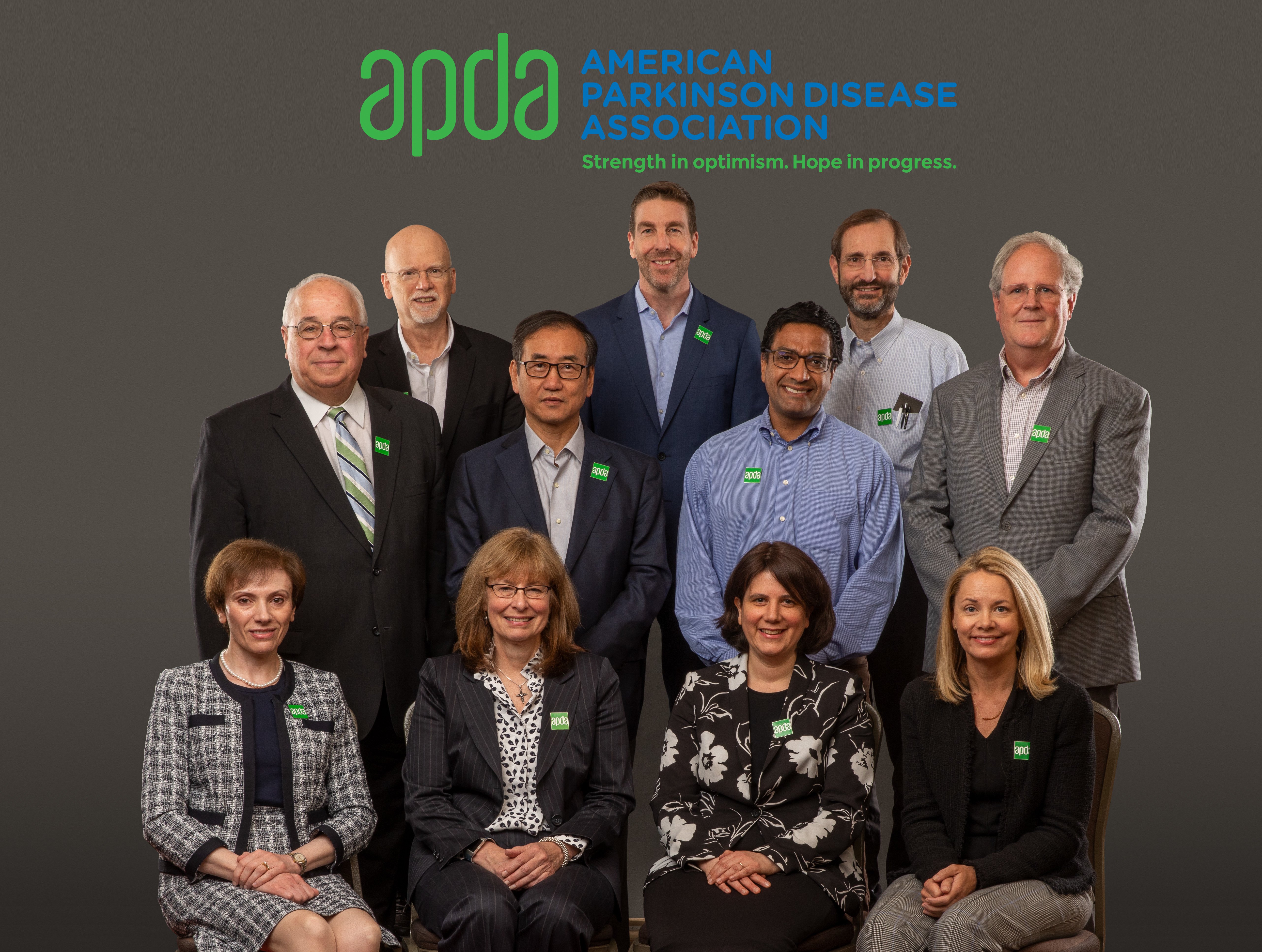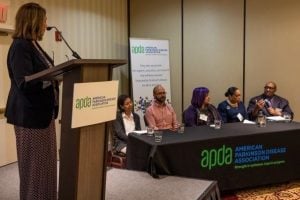AMERICAN PARKINSON DISEASE ASSOCIATION CONVENES EXPERTS TO DETERMINE PARKINSON’S DISEASE RESEARCH FUNDING AND TACKLE LACK OF DIVERSITY
APDA Hosts Top Scientists, Researchers and Neurologists for Two Days to Evaluate Research Projects Vying for Funding and Address Lack of Diversity in PD Research & Care
NEW YORK, NY, May 21, 2019 – For two days, the American Parkinson Disease Association (APDA) hosted two very esteemed groups of experts: the APDA Scientific Advisory Board for their annual meeting to review grant requests and determine which cutting-edge research projects will receive APDA funding for the 2019-2020 academic year; and a group of researchers and neurologists with specialized interest in the field of diversity at the first-ever APDA Diversity in Parkinson’s Research Conference.
Tough Decisions for Future Funding
Some of the brightest minds in Parkinson’s disease (PD) research gathered on May 16 to review the grant request proposals for APDA’s upcoming funding year. Competition was tough, with outstanding research projects from both up-and-coming researchers as well as established researchers looking for funding. APDA’s Scientific Advisory Board (SAB) diligently reviews every proposal and evaluates each one based on strict criteria to determine the most worthy and potentially impactful projects. Due to limited funds, APDA has to be very selective in its funding choices and focuses on research that supports new and promising ideas.
APDA’s SAB is comprised of scientists with a wide array of backgrounds and expertise in all areas relevant to PD. See photo caption for full list of members and affiliations.
Dr. Rebecca Gilbert, VP, Chief Scientific Officer at APDA said “It’s so exciting to see the fascinating ideas outlined in the grant submissions. Proposed research projects included everything from ways of detecting a diagnosis of PD in the blood to exploring ways that telemedicine can improve the lives of patients with PD. The SAB certainly had their work cut out for them and made some tough choices.”

APDA Scientific Advisory Board: (Back row L-R) J. Timothy Greenamyre, MD, PhD, University of Pittsburgh Medical Center; Clemens R. Scherzer, MD, Harvard Medical School and Brigham & Women’s Hospital; Joel S. Perlmutter, MD, Washington University School of Medicine; (Middle Row L-R) Patrick McDermott, Chairman, APDA Board of Directors; Un Jung Kang, MD, Fresco Institute for Parkinson’s and Movement Disorders, New York Langone Health; Vivek K. Unni, MD, PhD, Oregon Health & Science University; David G. Standaert,MD, PhD, Chairman of the APDA SAB, University of Alabama at Birmingham; (Front row L-R); Mary Maral Mouradian, MD, Rutgers Robert Wood Johnson Medical School; Leslie A. Chambers, President & CEO, APDA; Rebecca Gilbert, MD, PhD, VP and Chief Scientific Officer, APDA; Jill L. Ostrem, MD, University of California San Francisco; (Not pictured); Dennis W. Dickson, MD, Mayo Clinic, Jacksonville; Laura Marsh, MD, Michael E. DeBakey VA Medical Center; Evan Yale Snyder, MD, PhD, The Burnham Institute; Marie Hélène Saint-Hilaire, MD, FRCP (C), Boston University School of Medicine
APDA grants fall into several categories. Post-Doctoral Fellowships are awarded at $50,000 per year, and Research grants are awarded at $75,000 per year. Additionally, the prestigious George C. Cotzias Fellowship is a $300,000 grant given over three years to support promising young physician-scientists who are rising stars working to establish their careers in PD research, teaching, and patient service.
APDA Centers for Advanced Research receive $100,000 per year to support PD research activities. Detailed information about past APDA funding can be found online.
Each SAB meeting is also an important opportunity for updates on previously-funded research. In addition to the discussion of new research grants, David Standaert, MD, PhD, University of Alabama at Birmingham, presented an update on the APDA-funded research being conducted at his institution. He focused on the advances in understanding the role of brain inflammation in the development and progression of PD, a field that Dr. Standaert has pioneered. Joel S. Perlmutter, MD, Washington University School of Medicine also updated the SAB on the APDA-funded research his team has been conducting, which focuses on imaging biomarkers for PD.
This critical research funding is only possible due to the financial support from APDA’s steadfast supporters and the dedicated work of the SAB who gather on a regular basis to review and recommend funding the most cutting-edge projects. Final funding decisions will be announced in August.
Expanding the reach of PD Research and Care
Following the SAB meeting, APDA convened the first-ever Diversity in Parkinson’s Disease Research Conference on May 17 to address the unique and urgent needs surrounding PD in diverse and under- served communities. With the support of a grant from the prestigious Patient-Centered Outcomes Research Institute (PCORI), APDA gathered experts with interest in the topic to present current data concerning PD in diverse populations with the goal of broadening diversity among the PD research that is being done today and in the future.
The vast majority of PD research that has been done thus far has not fully represented the people who live with this disease and has predominantly reflected older, Caucasian men. While the research done to date has been tremendously valuable and our understanding of PD and our ability to tackle it would be in a very different place without it, APDA is eager to expand the research so that it’s more inclusive of people of varying ages, sexes, races, and ethnicities. The long-term objective is to understand the unanswered questions in the field of diversity in PD research, with the ultimate goal of fostering high- quality PD care for all.
This lack of diversity is not just relevant to PD research, it also applies to access to medical care, programs and services. There are significant disparities when it comes to who is getting the proper

Rosa Peña, APDA Senior Director of Programs and Services Field Operations, moderates the patient/care partner panel at APDA’s Diversity in Research Conference.
care and support they need, and who isn’t.
“APDA’s mission is to help everyone impacted by Parkinson’s disease live life to the fullest, and we mean everyone” states Leslie A. Chambers, President & CEO, APDA. “We were fortunate to receive a coveted PCORI grant to make this conference possible so we can start uncovering the gaps and figure out how to improve our efforts to make sure PD research, support, and services become accessible to all people.”
“At APDA we are hoping to get a better understanding of the lack of diversity and help accelerate this work and find solutions faster” states David Standaert, MD, PhD, Chairman of the APDA SAB, University of Alabama at Birmingham. “The APDA Diversity in PD Research Conference was a fantastic first step in finding answers. Together I think we can do great things to make both our research and services more inclusive and accessible.”
Ultimately, APDA plans to create a specific grant that will be awarded each year to support research that is focused on closing the diversity gaps.
# # #
CONTACT: Stephanie Paul | 718-981-8062 | spaul@apdaparkinson.org | apdaparkinson.org
About the American Parkinson Disease Association
The American Parkinson Disease Association (APDA) is the largest grassroots network dedicated to fighting Parkinson’s disease (PD) and works tirelessly to help the more than 1 million Americans with PD live life to the fullest in the face of this chronic, neurological disorder. Founded in 1961, APDA has raised and invested more than $185 million to provide outstanding patient services and educational programs, elevate public awareness about the disease, and support research designed to unlock the mysteries of PD and ultimately put an end to this disease.
